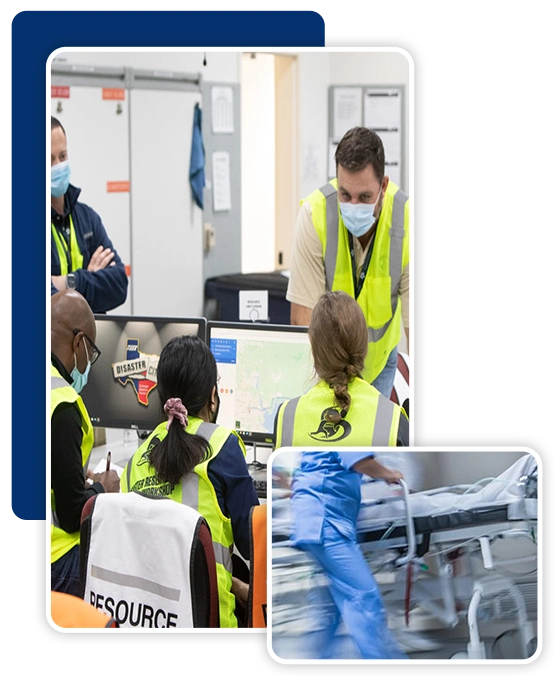Bachelor Emergency and Health Disaster Management
The Faculty of Health and Environmental Sciences at Vertex University offers the Bachelor of Health Emergency and Disaster Management program, which aims to prepare qualified staff with advanced skills in risk assessment and developing strategic response plans in order to contribute to strengthening the public health system. The program focuses on providing students with the cognitive and practical tools that enable them to make crucial decisions in times of crisis and raise the level of preparedness of health institutions to meet future challenges efficiently.
The program is based on establishing a strong scientific base in the fields of risk management and health emergencies. Students learn how to analyze disaster scenarios, develop appropriate responses, and coordinate efforts between different stakeholders. Emphasis is also placed on developing students' abilities in managing rapid response teams, designing evacuation plans, and implementing prevention strategies while adhering to international best practices in managing health crises. The program seeks to graduate specialists who are able to make immediate and effective decisions that combine innovation and strategic planning.
The program includes an advanced practical aspect that gives students an opportunity to test their skills in realistic situations through field exercises, emergency simulation, and applied studies of real cases. The program also provides training on health policies, relevant legislation, and resource management in times of disaster, preparing graduates to work efficiently in various public health and emergency institutions locally and internationally.
The implementation of the program is supervised by a group of professors and experts in the field of disaster management and health emergencies, ensuring the provision of updated scientific content that combines the theoretical framework and practical application. The university offers an advanced learning environment that includes advanced techniques to simulate crises, as well as research projects aimed at developing smart response systems. The program also offers opportunities to obtain specialized professional certificates, which increase the employment opportunities of graduates and prepare them to meet health challenges on a large scale.
The program opens wide doors for graduates in the labor market, including the fields of health emergency management, disaster response planning, risk analysis, hospital management during crises, and supervision of public health programs. They can also work in government sectors, international organizations, hospitals, research centers, or establish their own projects in the field of health and emergency counseling, giving them a variety of career paths in this vital sector.
Our Vision and Mission
The Emergency and Disaster Management Program at Vertex University prepares you with the skills of risk analysis, effective planning, and responding to health crises with global standards to lead change and make an impact at the most important times.
Our Vision
The Bachelor of Emergency and Health Disaster Management program at Vertex University should be a leading academic reference in preparing qualified competencies capable of leading emergency health response through an integrated education that integrates specialized knowledge and practical training in order to enhance the ability of health systems to predict and respond to crises, and ensure continuity of services in accordance with international standards.
Our Mission
The program aims to enable students to acquire advanced skills in health risk analysis, emergency planning, and disaster management through scientific methods and practical applications. It also focuses on preparing specialists who are able to employ health information technologies, epidemiological analysis, and resource management strategies to ensure the protection of public health and the sustainability of care in crises.
- Qualifying specialized staff in health emergency management: the program focuses on preparing students with advanced skills for emergency planning and rapid response to health disasters in order to ensure the protection of public health and the continuity of care delivery.
- Enhancing students' ability to analyze health risks: They are trained to read and analyze health data, and evaluate the epidemiological situation in order to make informed and evidence-based decisions in the face of health emergencies.
- Developing emergency response mechanisms for health disasters: the program gives students the ability to prepare and implement emergency plans in partnership with the relevant local and international bodies.
- Teaching the latest technological tools in health emergency management: students learn about the use of techniques such as artificial intelligence, health information systems, and big data analysis to help deal with disasters efficiently.
- Developing coordination skills between stakeholders: students gain the ability to cooperate and work within medical teams, relief institutions, and government bodies to ensure a unified and organized response.
- Building leadership and decision-making skills in stressful environments: students learn how to manage health teams during crises and make quick and effective decisions in times of stress and emergency.
- Spreading a culture of prevention and reducing the effects of health disasters: students are directed towards proactive thinking to reduce the impact of crises on individuals and communities through effective proactive plans.
- Enabling students to enter the labor market in the field of health emergencies: the program qualifies them to work in health institutions, humanitarian organizations, government bodies, and companies specialized in health risk management.
- Introducing students to the legal framework governing health emergency management: relevant health legislation and policies are taught at the local and international levels.
- Instilling ethical principles in dealing with health emergencies: the program focuses on promoting professional and ethical commitment, and ensuring transparency and discipline in disaster management.
Teaching methods and strategy

case studies
Real cases and simulation are integrated into the courses of the Bachelor of Emergency and Health Disaster Management program at Vertex University. Students deal with scenarios that represent health crises and disasters to analyze the nature of threats and build effective response plans. The program focuses on understanding epidemic patterns, managing emergency situations, and coordinating intervention efforts in accordance with international standards. Students are also trained to assess health risks in multiple environments, giving them intellectual and practical skills to provide innovative solutions that enhance the resilience of health systems and protect society from the effects of disasters.

Scientific projects
Practical projects play an essential role in enhancing the practical aspect of students. They work to design comprehensive plans for managing health emergencies, studying the impact of disasters on communities, and developing effective prevention programs. These projects include using health data analysis tools, applying artificial intelligence techniques to predict epidemics, and providing effective solutions for immediate response. Students will also learn how to assess the readiness of health facilities and design smart logistics plans to ensure the continuity of supplies and services during crises.

Teaching strategies
The Bachelor of Emergency and Health Disaster Management program is based on an interactive education approach that combines theoretical study and practical application through modern digital education techniques. Courses are delivered through interactive electronic lectures, live simulation sessions of response plans, and case studies of real crises. Educational strategies also include group discussions, field research projects, and workshops that support health analysis and planning skills, enabling students to assess risks and coordinate response efforts effectively.
What can you do with a Bachelor's degree in Emergency and Disaster Management in Health?
A graduate of this specialization has a wide opportunity to work in quality jobs that require advanced skills in health emergency management, crisis planning, and risk analysis, making it a pivotal element in protecting communities and enhancing the resilience of health systems. These jobs include:
Be among the decision makers in emergency planning and managing health crises.
- Emergency Health Management Specialist
- Director of Hospital Emergency Management
- Public Health and Epidemic Control Specialist
- Emergency Officer at the Ministry of Health
- Health relief coordinator in humanitarian organizations
- Health Risk Analyst
- Emergency Management Training Specialist
Lead national and international projects in building more flexible and responsive health systems.
- Director of Occupational Safety and Health
- Health Disaster Management Advisor
- Specialist in medical logistics in disaster situations
- Emergency Response Coordinator in International Organizations
- Researcher in Health Emergency Management
- Health awareness specialist during crises
- Health preparedness coordinator in private sector companies
Get a consultation
Free now
Do you want to help?
+1 (984) 382-6080
Target group for the Bachelor of Emergency and Health Disaster Management program

The Bachelor of Emergency and Disaster Management at Vertex University aims to provide students with advanced skills in health emergency management, risk assessment, and effective disaster response planning, making it the perfect choice for a wide range of ambitious groups:
- High school graduates who aspire to build a strong career in the field of emergency management and health disasters, which will qualify them to work in health bodies, hospitals, and relief organizations.
- The program is suitable for staff in hospitals, public health centers, or health administrative bodies. They can develop their skills in crisis management and health planning, giving them a competitive advantage and broader opportunities to advance to leadership positions in the field of health emergency management and health risk management.
- For those with a diploma in public health, nursing, or hospital administration who wish to enhance their academic future, this program helps them complete their studies to obtain a bachelor's degree and specialize in a vital and influential field in protecting public health and sustaining health services during crises.
- If you run a health care organization or develop crisis management solutions, acquiring emergency planning skills, analyzing health risks, and managing rapid response teams will help you enhance your organization's preparedness and improve its ability to respond to health crises efficiently.
Enhance your professional skills with international certifications
Presented by the International Association of Emergency Managers (IAEM), it is considered one of the most important certifications in crisis and disaster management at a global level.
Dedicated to health emergency management personnel in hospitals and medical institutions, which enhances their skills in responding to health disasters.
It focuses on developing strategies to deal with epidemics and health emergencies, and enhances the ability of health institutions to deal with crises.
Helps specialists prepare plans to ensure continuity of health services during crises and disasters.
It focuses on analyzing health risks, improving safety policies, and reducing the impact of crises on health systems.
Helps develop effective plans to deal with health crises and reduce their effects.
Admission Requirements
- Regular admission: the student must have a high school diploma or equivalent.
- Conditional admission: Vertex University may accept conditional admission for applicants until all their papers are completed (terms and conditions apply in this category).
- Proficiency in English if the language of instruction is in English and the student passes the language test
- The student must meet the conditions for admission to the Bachelor of Emergency and Health Disaster Management.
- To submit the original certificates obtained with true copies.
- The student must fill out the electronic application for admission and registration at the university.
- The student must pay the registration fees and the prescribed tuition fees.
- To sign a pledge to comply with all university rules and regulations.
Required Documents
- A colored copy of the certificate issued by the student's country “Ministry of Education” for those with a high school qualification.
- A colored copy of the student's or family ID for matching.
- A colored copy of the student's passport.
- Personal photo (6*4) with a white background.
- Complete the registration data and sign it by the student.
Requirements for Obtaining Bachelor in Emergency and Health Disaster Management Specialization
| Number of Credit Hours Required to Complete the Bachelor Degree | 120 Minimum Required Credit Hours |
|---|---|
| Number of Required Academic Semesters | 8 Academic Semesters |
| Number of Semesters per Year | 3 Semesters |
| Annual Credit Hours | 45 Credit Hour |
| Semester Duration | 8 to 10 weeks |
| Expected Duration to Complete the Program | 2 years and 8 months |
Advantages of this system.
- Complete your bachelor's degree in less than 3 years instead of the traditional 4 years
- Flexible distribution of material throughout the year, allowing learning to continue without long interruptions
- An intensive schedule but allows you to finish school quickly. It is ideal for students who want to enter the labor market quickly
*This system was designed at Vertex University to enable students to obtain their university degree in a shorter time while maintaining the quality of education and the efficiency of the academic process.

Want to get more information?
Register your details and we will contact you as soon as possible
Frequently Asked Questions about Bachelor Emergency and Health Disaster Management
The primary language is English, with language support and helpful content in Arabic available when needed.
Yes, health diploma holders can apply for bridging programs after studying academic gaps.
The college seeks to obtain CAHME and APHEA accreditation. The curricula are designed according to academic and professional quality standards.
Yes, students can choose a flexible system that fits their practical obligations.
Yes, the study can be temporarily postponed or suspended for a maximum of two semesters according to university policy.
